Having lived in Texas over ten years now I can see why okra is so popular in the South. In our personal experience with hot Texas summers, we have found that okra is one of those crops that thumbs its nose at the hot, sweltering Texas sun and says “Come on, is that the best you got?” It is an extremely prolific, heat/drought tolerant crop that has done well for us every time we have planted it so far, thank the Lord.
This has presented a problem, albeit a good problem, for me in terms of the best way to capture and preserve it. You can certainly pressure can it but that is not our preference because we like to preserve it with all of its nutrients and freshness. Okra is a nutrient powerhouse, so we are excited and very motivated to incorporate it into our diets.
The last couple of years I cut it up and lacto-fermented it in a salt brine but found I didn’t prefer it for a couple of reasons. For those of you who don’t know, okra has this “snotty”, “mucusy” stuff inside each pod that is really healthy and beneficial but kind of gross. And, for some reason, I still haven’t nailed the salt brine recipe and have had a lot of hits and misses.
Thankfully, some time last year my friend and neighbor, Shannon, and I were talking about okra and she mentioned lacto-fermenting it leaving the okra pod in tact and not cutting it up. I was very excited when she mentioned that and was eager to try it. First of all, it meant a lot less prep time and also, maybe a reduction of the “snot” factor.
Fast forward to mid-summer and our okra plants were starting to produce each day. If you’ve ever grown okra, you know that it grows measurably every day. You could probably sit and literally watch it grow if you had the time. At first, I cut them up and put them fresh in our salads each night, which is crunchy and delicious, by the way, and the “snotty” factor is virtually non-existent in fresh, cold okra. But then the floodgates opened and a big okra surplus started to mount up. I remembered I had preserved garlic cloves in apple cider vinegar and really liked the flavor so I decided to do the same with okra. I went out and bought a really cheap jug of apple cider vinegar at the store and off I went!
Here is our beeeeeautiful okra, probably just one days worth:
So I quickly rinse them and, it’s not necessary but I like to cut off the stems so they fit in the jars better:
Then I just shove them in the jars however they will fit:
You can usually get a gallon jug of cheap apple cider vinegar for under three dollars. Even though it is not organic with “the mother” in it (a colony of beneficial bacteria promoting good gut health), cheap apple cider vinegar is still a great preservation vehicle and a pre-biotic, which means it feeds probiotics. So it’s still a great way to preserve. It also provides a really nice pickling-like taste:
I just pour in the apple cider vinegar and leave about 1″ space at the top:
A very important step that I had forgotten but a friend reminded me, is placing in the jars something that contains tannin. This keeps the okra nice and crunchy, where it would otherwise become soft and mushy over time. Thankfully, we have oak and mesquite trees right outside our house, so I just place a few leaves of one or the other in each jar.
Another step worth noting is that you may find you need to burp your jars for the first few days to release the buildup of any CO2 (carbon dioxide) gases. But since you are not waiting for an official fermenting process, you can eat the pods as soon as you like!
All in all, we preserved over 50 quarts of okra this garden season, all thanks to God for bringing the increase! I went ahead and numbered each jar so we can be sure to eat the oldest ones first. Since the pickle taste can be pretty tangy, I quickly rinse the pods before I put them in salads, etc., and it leaves a really nice pickled okra taste. You may wish to add in any other spices/flavors to customize your preserved okra to your liking. If you want to tone down the tang, just soak the okra in filtered water over several hours before you want to use it.
This way of preserving should keep for many months, although your experience may vary.
We are extremely thankful to God for His bountiful okra harvest and a very quick and simple way to preserve it!
Susan
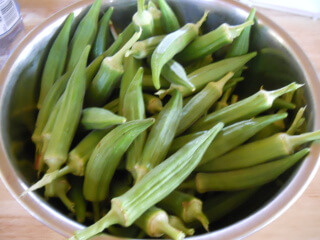
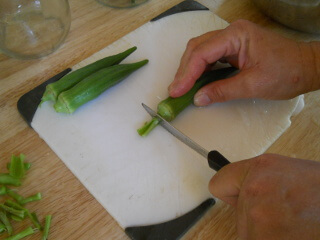
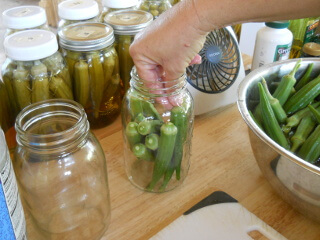
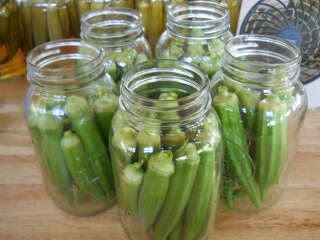
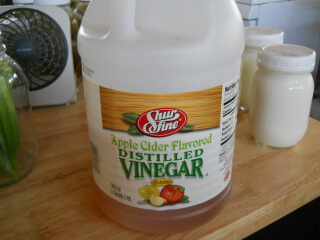
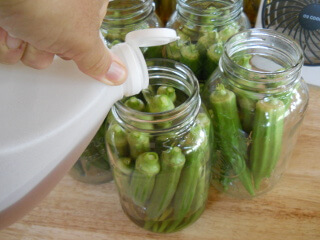
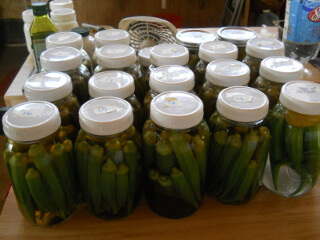
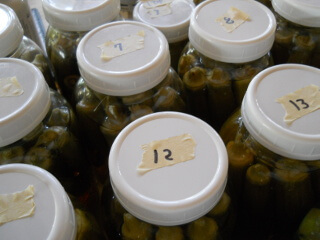
Thanks for the okra tips. I usually pickle mine the traditional way with Apple cider vinegar, salt, garlic,dill and one hot pepper per jar. I do process this in a boiling water bath camber for about 15 minutes. I will have to try the fermentation method.
Jill
Hi bayougirl!
And thanks for taking the time to comment. Your pickling method sounds very tasty; I appreciate you sharing it!
We always enjoy hearing from you 🙂
Susan